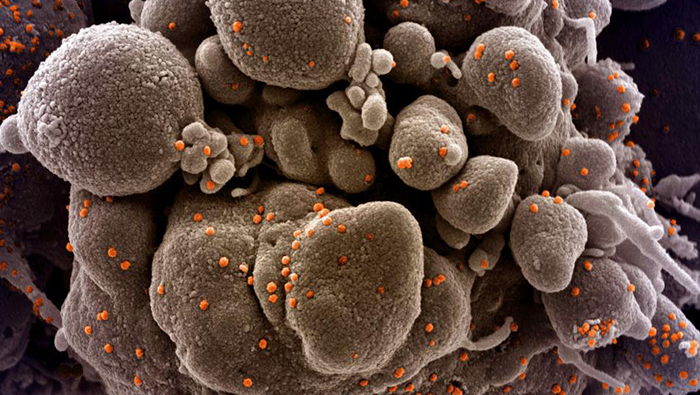- International News
- Tue-2020-12-22 | 02:27 pm

London: Following alarming reports of a highly contagious coronavirus mutation in the United Kingdom, mainland Europe has sealed itself off.
According to British authorities, the new virus
variant is up to 70 per cent more contagious than the previously known
form. It's also spreading rapidly, especially in London and southeast
England. As a result, exit and travel restrictions in the country have
been significantly tightened.
However, so far there
is very little reliable information available about the mutation. So
far, it can only be assumed that the current spike in new infections in
UK has something to do with the new variant.
And even if the virus is spreading faster, that doesn't mean this variant is actually more dangerous.
Mutations are common
It's
not unusual to discover such a mutation. In China, for example, where
the pandemic originated in late 2019, a new variant of the pathogen was
already circulating six months ago. In the summer, another variant
spread rapidly from Spain to half of Europe. Viruses mutate all the
time, and in most cases these mutations have no or only minimal effects.
Despite all attempts at isolation, the mutation now confirmed in southern England has also long since spread to mainland Europe and other parts of the world, according to Christian Drosten, virologist at the Charite Hospital in Berlin. The virus has been present in England since at least late September, he said. "We know now: it's already in Italy, in the Netherlands, in Belgium, in Denmark — even in Australia. Why shouldn't it be in Germany?"
How does the body react to mutations?
Normally,
the human body is able to protect itself against viruses. It produces
antibodies that defend against viral attacks and trigger immunity to the
pathogen.
However, if the pathogen has already mutated and the
antibodies produced are programmed to an older version of the pathogen,
then these antibodies are much less effective.
That's why
humans regularly get the common cold. Our body has already formed
antibodies for previous colds, but we haven't yet formed new antibodies
for the newly mutated pathogen.
But there's no reason to panic — a virus doesn't necessarily become more dangerous through mutation. In fact, some mutations can also significantly weaken a virus.
How do mutations occur?
When
the human body develops antibodies against a virus to prevent a disease
outbreak, a virus must change its envelope, or outer surface, to avoid
being recognised by the antibodies and immune cells. Thus, to survive, a
virus must change its outer proteins and develop new strains.
The new variant registered in the UK has several mutations in the spike protein of the coronavirus. Due to a so-called gene deletion, it's missing two amino acids, which may make it easier for the virus to spread.
British researchers from the COVID-19 Genomics Consortium have just published a detailed profile of the new B.1.1.7 cluster, including a description of the gene deletion.
A similar deletion
had already been observed in East Asia over the summer. There, however,
the mutated SARS-CoV-2 variant caused milder infections because it
apparently weakened the coronavirus.
Are the new vaccines now ineffective?
The
United Kingdom was the first country in Western Europe to begin a
large-scale vaccination campaign. But the newly registered mutation
won't make the new vaccines ineffective. These vaccines are all designed
to encode the information for the coronavirus spike protein in such a
way that it will still stimulate the immune system despite the mutation,
said virologist Christian Drosten.
Fortunately, it takes more
than a few mutations for a virus to have its proteins altered so that
they can bypass immune protection.
Nevertheless, we know from
influenza, for example, that flu viruses are able to mutate very quickly
and that vaccines must be readjusted each flu season to remain
effective.
As a result, the COVID-19 vaccines will likely need further adjustment as well. But information gathered during the ongoing pandemic, and the newly built production capacity, will continue to ensure a rapid supply of affordable vaccines in the coming months.













